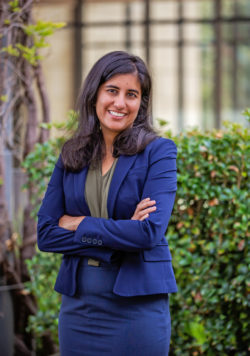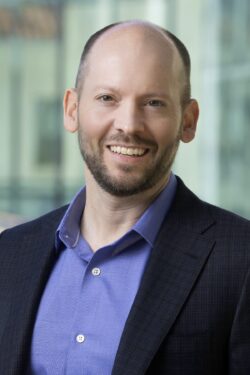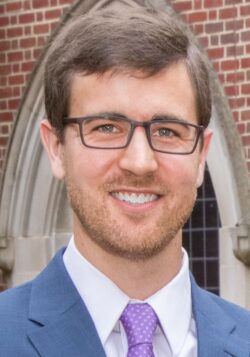Stanford Law School Expands Faculty With Three New Professors
STANFORD, CA – June 8, 2023 – Stanford Law School (SLS) recently welcomed three new professors who will expand the school’s core curriculum, as well as its resources in connection with its renowned clinics and centers. The new faculty members are Easha Anand, a civil rights and Supreme Court litigator; Robert Bartlett, a corporate finance and securities regulation scholar; and Jud Campbell, a First Amendment law and constitutional history scholar. These additions, along with the recent hiring of Rule of Law Impact Lab Director Amrit Singh, bring the school’s total number of core faculty to more than 65.
“We are delighted to welcome these exceptional teachers, practitioners, and scholars to Stanford Law School,” said Jenny Martinez, Richard E. Lang Professor of Law and Dean of Stanford Law School. “They represent the highest levels of legal practice and scholarship in their respective areas and will contribute significantly to the robust curriculum and student mentorship that define Stanford Law School.”
Easha Anand Brings SCOTUS Experience to Clinic

The Edwin A. Heafey, Jr. Visiting Professor of Law at SLS since September 2022, Easha Anand joins the faculty as an assistant professor and co-director of the Supreme Court Litigation Clinic. Prior to her visiting professorship at SLS, Anand was Supreme Court and appellate counsel at the MacArthur Justice Center, where she litigated police excessive force, prison conditions, habeas, and other criminal defense and civil rights cases around the country.
“It is a privilege to join a law school that puts such a strong emphasis on the clinic experience,” Anand said. “Working with students full-time has allowed me to see not only how brilliant my students are but also how thoughtful and how deeply committed they are to making the world a better place.”
A former clerk to Supreme Court Justice Sonia Sotomayor, Anand said one of the skills she honed during her time at the Supreme Court was “how to speak to a broad audience, including to judges who are not necessarily predisposed to accepting the arguments you’re making.” “It’s easy in this day and age to assume you know how a judge will vote, but my time at the Court taught me that being right on the law matters,” Anand said. “I hope to help my students see that good lawyering always matters.”
Anand received her bachelor’s degree from Yale University and her JD from the University of California, Berkeley, School of Law.
Robert Bartlett: A Leading Voice on Market Microstructure
Robert Bartlett joins SLS as the W. A. Franke Professor of Law and Business from the faculty at the UC Berkeley School of Law, where he taught since 2009, co-directed the Berkeley Center for Law and Business, and served as the founding co-director of Startup@BerkeleyLaw, a platform for training students, entrepreneurs, and investors on issues confronting early-stage companies.

Bartlett was a visiting professor at SLS in 2022, during which time he taught securities regulation. One of his primary areas of scholarship is what he calls “the plumbing of the equity markets,” more formally known as market microstructure, a data-rich branch of finance concerned with the listing and trading of investment securities.
Bartlett started his legal career at a Silicon Valley law firm representing early-stage companies and venture capital firms, during which time he developed models to automate certain commonly used pricing analyses. Much of Bartlett’s teaching and research continues to focus on venture capital finance. Outside of the classroom, Bartlett has also worked on several initiatives with the National Venture Capital Association to increase the accessibility of venture capital finance for entrepreneurs outside of the traditional startup hubs such as the Bay Area.
“As a visiting professor last year, I found the students at Stanford to be incredibly engaged and curious,” Bartlett said. “My office hours were always full, with students coming by to continue the classroom conversations. I look forward to engaging again with the students and to working with many friends and longtime collaborators at Stanford.”
Bartlett received his BA from Harvard University and his JD from Harvard Law School.
First Amendment Scholar Jud Campbell Returns to SLS
Executive Director of the SLS Constitutional Law Center from 2013-2016, Jud Campbell, JD ’11, returns to SLS as a professor of law. His scholarship focuses on First Amendment law and constitutional history. He will teach Constitutional Law and Property during his first year with the law school. Most recently, Campbell was a professor at the University of Richmond School of Law. He was a visiting professor at Harvard Law School in spring 2023 and at the University of Chicago Law School in fall 2022.

“It is a dream come true to return to Stanford Law School where I already have so many friends and professional collaborators,” Campbell said. “When I was a student at Stanford, I never imagined that I would one day be returning as a professor.”
Campbell’s scholarship explores the history of constitutional rights, including the First Amendment’s protection of free speech, where he has made novel arguments about what the founders contemplated in drafting the First Amendment.
After completing his JD at SLS, and prior to joining the University of Richmond School of Law, he clerked for Judge Diane S. Sykes on the U.S. Court of Appeals for the Seventh Circuit, and for Judge José A. Cabranes on the U.S. Court of Appeals for the Second Circuit. He received his BA from the University of North Carolina and holds two master’s degrees from the London School of Economics.
About Stanford Law School
Stanford Law School is one of the nation’s leading institutions for legal scholarship and education. Its alumni are among the most influential decision makers in law, politics, business, and high technology. Faculty members argue before the Supreme Court, testify before Congress, produce outstanding legal scholarship and empirical analysis, and contribute regularly to the nation’s press as legal and policy experts. Stanford Law School has established a model for legal education that provides rigorous interdisciplinary training, hands-on experience, global perspective, and focus on public service, spearheading a movement for change.
